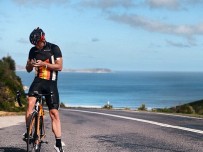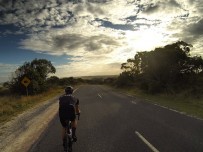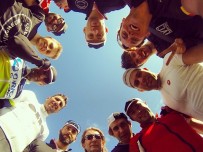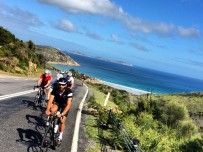The Tour of Bright is one of the few weekends per year that I keep sacred. It sets a stake in the sand which keeps me motivated through those cold, dark winter mornings. It’s not so much the race that I love, but more so the process of getting ready for it which I find so intensly satisfying.
I’ve done half decently at the Tour of Bright in the past because of the motivation it instills in me. Many years in the past I’ve raced A-Grade but one edition I raced Masters because that’s where most of my mates were. To me, that’s what it’s all about.
I won my category (Masters 123) that year, but I didn’t feel good about it. Really, I should have been getting spanked in A grade. I have to admit the depth wasn’t overwhelming in Masters, but there were still some good competition.
Since that time I can only begin to describe how much the level in Masters racing has progressed. The depth, the speed, the level of experience, and the professionalism of the teams is outstanding (even though teams racing technically isn’t allowed).
The riders who make their way onto the podium this weekend in Masters A this year will likely place top 10 in Open A category. Which brings me to my point.
To me, the spirit of Masters racing should be riders who are at the same point in their lives and who can dedicate a similar amount of workload towards their cycling. Most people I speak to consider Masters racing to be the category you compete in when you have a family, a career, and manage to fit your cycling in around that. Not a category where the competitors are in still in their 30s and training like they’re full-time athletes. Of course there’s no rule stating this, but in my mind Masters racing should be a place where the “middle aged athlete” can compete against each other on a relatively level playing field and not need to worry about it taking up their life in order to be competitive.
This weekend, the eventual winner of Master’s A will likely be doing no less that 15 hours of training per week and making whatever personal sacrifices that entails (it’s different for everyone). I’ve know of riders training and sleeping in altitude tents, cutting back on work hours, and riders having generous sponsorships that allow them to afford the best equipment and support. And good on him. But is Masters racing the right category to be playing this game in?
The playing field in Masters is not level. Sure everybody has different levels of experience and physiology, but there is a wide variation in the level of commitment that various riders can apply to their racing. Unfortunately the guy who can only afford 10 hours of training per week will never be able to compete with the ones who are “fully committed”.
Should Masters racing start at 40 instead of 30? Would this be the best way to level the playing field to ensure most are at the same point of their lives? My ultimate preference would be having a whereabout system and only allowing 10 hours of training per week (joking of course…well, kind of).
There’s an extraordinary difference between the 30-year-old who is still in his prime and carrying very few responsibilities and a 40-year-old with three kids, a career, and who just wants to compete the best he can on 6-10 hours of riding per week.
Perhaps dropping down to Masters B is the answer? Or would the competitiveness of Masters B would eventually begin to reach new heights?
Previous to this year the Tour of Bright has been categorised into age groups. Changing toward a A, B, C categories seem to be the right step forward into classifying the various levels of ability.
The danger I see in this ultra-competitive Masters racing is that for some people merely participating becomes such an unreachable goal that they stop trying. Should cycling be a sport where at the amateur level the stakes are so high that you need to dedicate 20hrs of training per week just to have a shot at competing?
Don’t get me wrong — I love the competitive spirit that a race like the Tour of Bright brings out in people. I just wonder how healthy it is for the sport and people trying to enjoy it.
Or am I just having a whinge because I can’t compete at the top level anymore? Should I accept that I’ll only be packfill for the rest of my racing life because I’m not willing to make the same personal sacrifices? Should everyone in my shoes accept this? Or should there be a way that separates these ultra-competitve Masters racers from the rest of them? Is a national grading system which places a closer watch on individual’s results be the answer?
Interested in hearing your thoughts.














